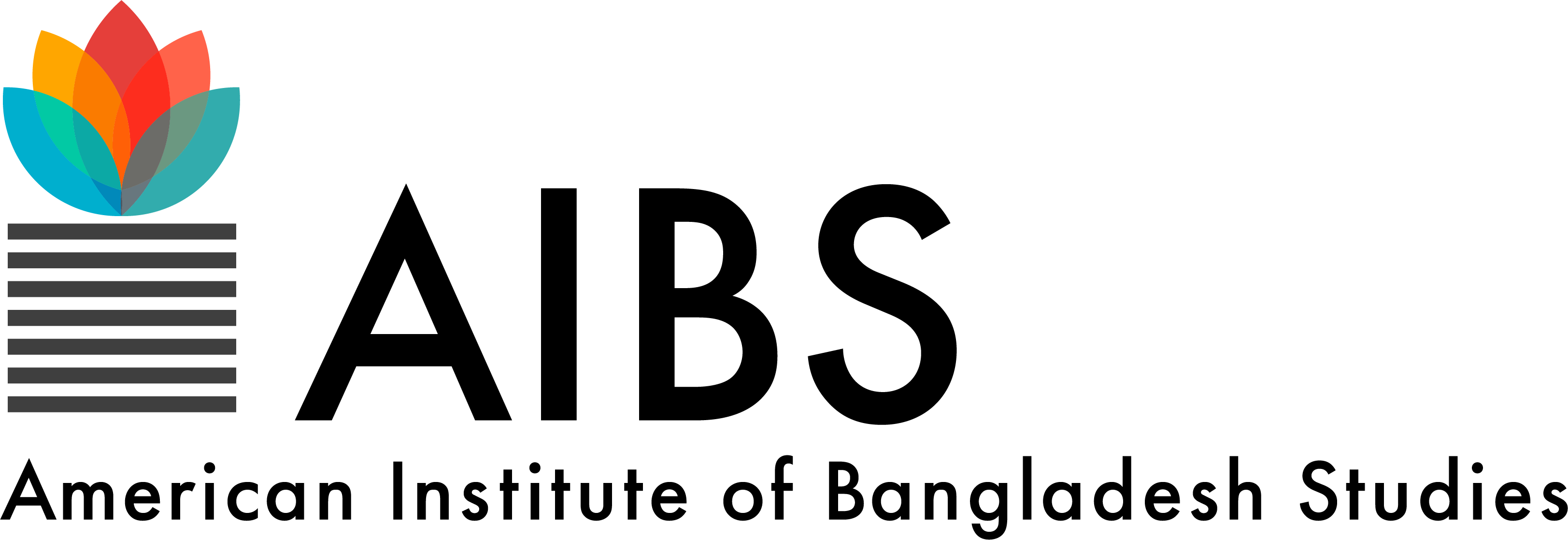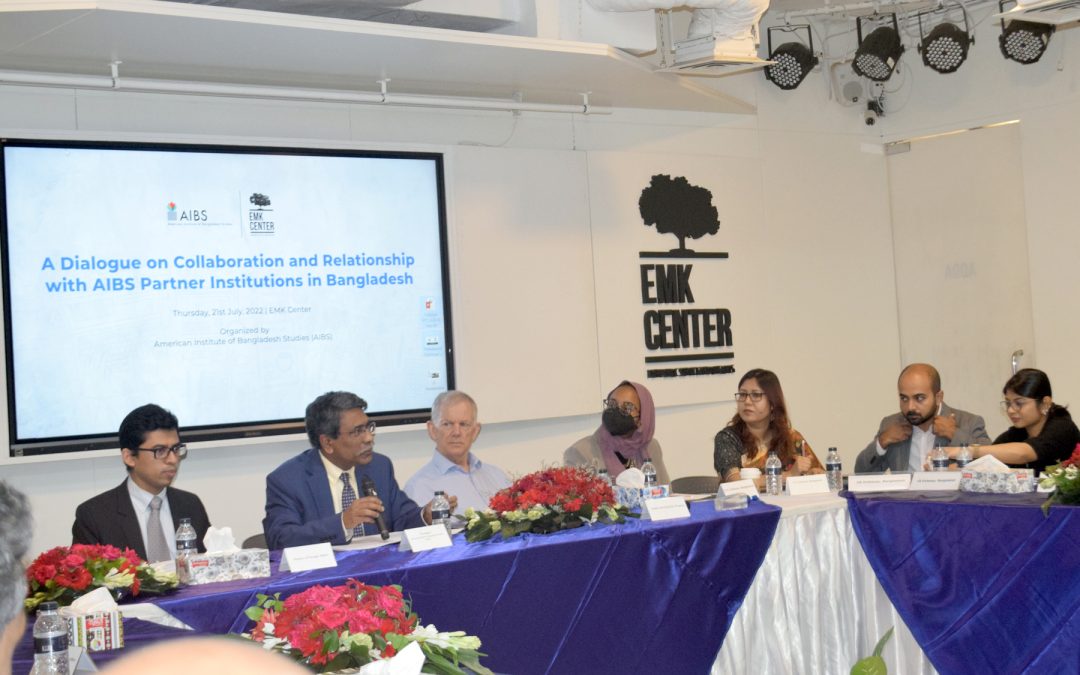21 July 2022, EMK Center, Dhaka, Bangladesh
 Greater cooperation and collaborative research among Bangladeshi and US universities have been emphasized in a dialogue held on 21 July 2022 at the EMK Center in Dhaka organized by the American Institute of Bangladesh Studies (AIBS). The dialogue was chaired by the AIBS President Professor Dr. Ali Riaz and attended by representatives from 23 Bangladeshi universities. Among the participants, several senior university administrators such as Vice-Chancellors, Registrars, Deans of the Faculty, Chairman of the Departments and Professors, representatives from the Ministry of Foreign Affairs, Government of Bangladesh, and the U.S. Embassy were present at the event.
Greater cooperation and collaborative research among Bangladeshi and US universities have been emphasized in a dialogue held on 21 July 2022 at the EMK Center in Dhaka organized by the American Institute of Bangladesh Studies (AIBS). The dialogue was chaired by the AIBS President Professor Dr. Ali Riaz and attended by representatives from 23 Bangladeshi universities. Among the participants, several senior university administrators such as Vice-Chancellors, Registrars, Deans of the Faculty, Chairman of the Departments and Professors, representatives from the Ministry of Foreign Affairs, Government of Bangladesh, and the U.S. Embassy were present at the event.
In his opening remark, Professor Ali Riaz asserted that AIBS prioritizes to create professional development opportunities for Bangladeshi young academics in the U.S. universities through several exchange, outreach, and scholarship programs. Professor Riaz thanked the Ministry of Foreign Affairs for their financial support and cooperation, which has enabled the AIBS professional development fellowships to Bangladeshi academics and graduate student fellowships to Bangladeshi PhD students studying at different the U.S universities in recent years. Some of the fellows were present at the event and they shared their experiences and research activities.
Mr. Tarique Mahmud Pasha, representative of the Ministry of Foreign Affairs (MoFA) highlighted the close relationship between Bangladesh and the U.S. and thanked the AIBS for facilitating scholarly exchanges between the countries. Ms. Raihana Sultana and Khadija Mohamud, representatives of the U.S. Embassy, Dhaka spoke about various professional development programs and fellowships that are available for Bangladeshi academics through the U.S. Embassy in Bangladesh.
 The dialogue also discussed how to strengthen a meaningful and sustainable relationship and further collaboration among Bangladeshi and U.S. academic institutions. The participants underscored the need for opening avenues for more collaborative research among scholars of these two countries. It was also noted that a network among the AIBS affiliated institutions should be built to have cooperation in research and scholarship.
The dialogue also discussed how to strengthen a meaningful and sustainable relationship and further collaboration among Bangladeshi and U.S. academic institutions. The participants underscored the need for opening avenues for more collaborative research among scholars of these two countries. It was also noted that a network among the AIBS affiliated institutions should be built to have cooperation in research and scholarship.
Besides,
Participants from the partner universities explored various avenues to further collaboration between Bangladesh and the U.S. universities and to enrich collaboration and people to people contact through the AIBS. They also discussed best practices to sustain and strengthen relationship in the coming days. The following suggestions/recommendations asserted from the participants:
Recommendations
-
- AIBS makes greater efforts to get the programs and opportunities of the AIBS known to the faculty members of the partner institutions in Bangladesh. It was suggested that the AIBS requests the partner universities to highlight their partnership with the AIBS and provide a link in their websites to disseminate information. It was also suggested that short videos (2-3 minutes) of the AIBS fellows should be posted on the AIBS website.
- On the AIBS website, it should be mentioned that along with the humanities and social sciences, support for faculty and students of sciences and engineering disciplines are available.
- A newsletter, either electronical or printed, be published periodically by the AIBS Dhaka office highlighting the works of the partner institutions and disseminate among the member institutions in the USA and Bangladesh.
- A network among the participants of this meeting be created under the sponsorship of the AIBS Dhaka office to continue the communication and collaboration among them.
- The AIBS explores ways to enhance collaborative research projects among faculty of Bangladeshi institutions and connect them with member institutions in the USA.
- The AIBS serves as a conduit to help the partner institutions improve English language skills of the junior faculty and graduate students of the partner institutions; the AIBS should help connect the partner institutions with the English language programs offered by the American Center at Dhaka.
- Newly established universities lack resources in curriculum development, the AIBS should explore ways to help develop resources (such as TOT) for curriculum development.
- Resume the AIBS Lectureship program, arrange lectures of visiting scholars from the USA, and organize annual lecture at various universities. It was recommended that an annual lecture program should be established and rotate among the partner universities. It should avoid an urban bias. The topics of the lectures could be both academic and public policies. It was recommended that a draft of criterion of speakers and selection process be developed by the AIBS US office and shared with the Bangladeshi partner institutions for their inputs. The North South University, one of the private universities in Bangladesh, has offered to hold the first lecture on the US-Bangladesh relationship in 2022/23.
- Organize an international conference in Dhaka with the participation of faculty members of the partner institutions in Bangladesh and the U.S.
- Arrange an annual meeting with the representatives of the partner institutions to enhance the close cooperation.
- Explore avenues for more collaborative research among faculty of various members institutions in the USA and Bangladesh.
- Increase the number of partner institutions in Bangladesh.
- Opportunities for individual membership of the AIBS be created for Bangladeshi faculty and independent scholars.

